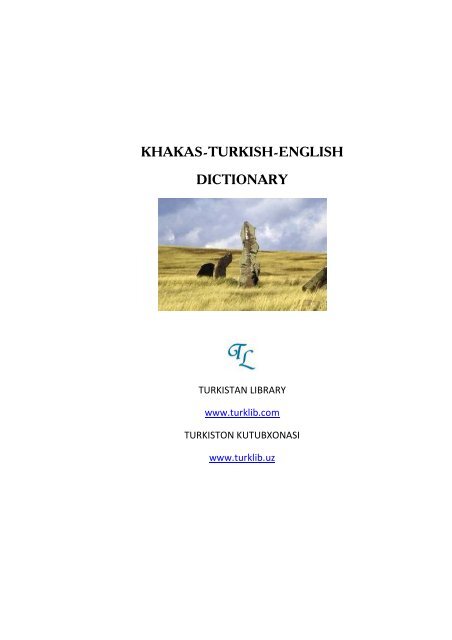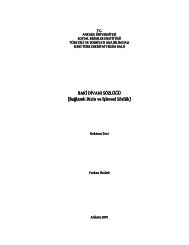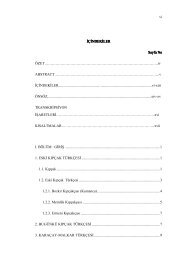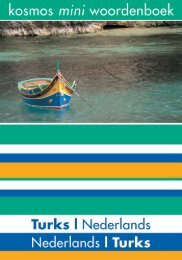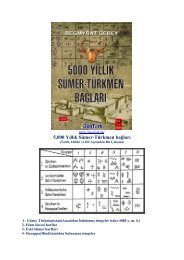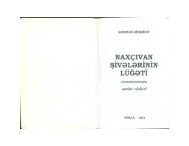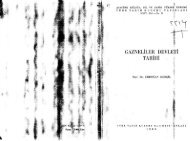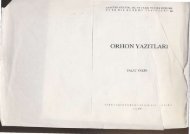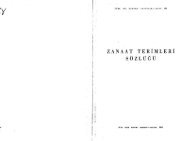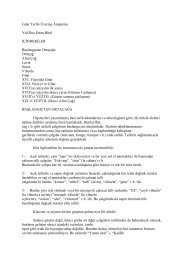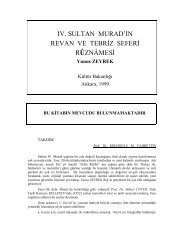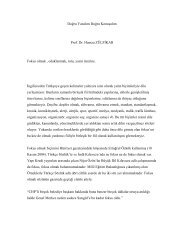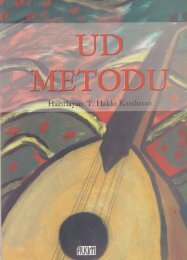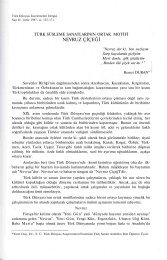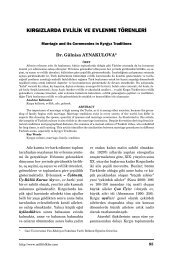khakas vocabulary - Turuz.info
khakas vocabulary - Turuz.info
khakas vocabulary - Turuz.info
You also want an ePaper? Increase the reach of your titles
YUMPU automatically turns print PDFs into web optimized ePapers that Google loves.
KHAKAS-TURKISH-ENGLISH<br />
DICTIONARY<br />
TURKISTAN LIBRARY<br />
www.turklib.com<br />
TURKISTON KUTUBXONASI<br />
www.turklib.uz
THE KHAKAS LANGUAGE<br />
Khakas is a Turkic language spoken by the Khakas people, who mainly live in the southern<br />
Siberian Khakas Republic, or Khakassia. The Khakas number 78,500, of whom 60,168 speak the<br />
Khakas language; most people are bilingual in Russian.<br />
Traditionally, the Khakas language is divided into several closely related dialects which take<br />
their names form the different 'tribes': Sagay, Kacha, Koybal, Beltir, and Kyzyl. In fact, these<br />
names represent former administrative units rather than tribal or linguistic groups. Later on, the<br />
Shor dialect was recognized as a Khakas dialect as well. The people speaking all these dialects<br />
simply refer to themselves as Tadar (i.e. Tatar).<br />
The Khakas literary language, which was developed only after the Russian revolution, is<br />
based on the central dialects Sagay and Kacha; the Beltir dialect has largely been assimilated by<br />
Sagay, and the Koybal dialect by Kacha. The Shor dialect of Khakas is spoken by people who<br />
originally came from Shoria, an area bordering on the west of Khakassia. The language spoken<br />
in Shoria, Shor, is closely related to Khakas, and can in fact be regarded as a dialect of Khakas.<br />
The first text recordings of Khakas originate from the 19th century. The Finnish linguist<br />
Matthias Castrén, who travelled through northern and Central Asia between 1845-1849, wrote a<br />
treatise on the Koybal dialect, and recorded an epic (1857).<br />
Wilhelm Radloff travelled the south Siberian region extensively between 1859 and 1870. The<br />
result of his research was, among others, published in his four volume dictionary, Versuch eines<br />
Wörterbuches der Türk-dialecte (1893-1911), and in his ten volume series of Turkic texts,<br />
Proben der Volkslitteratur der türkischen Stämme (1866-1907). The first two volumes contain<br />
his Khakas and Shor materials, mainly epics and songs, which are provided with a German<br />
translation. The ninth volume, compiled by Radloff's student Nikolaj Fedorovich Katanov, who<br />
was a Khakas himself, contains further Khakas materials.<br />
Apart from some minor publications, it was only in the forties of the twentieth century that<br />
publications in Khakas on a larger scale started off.<br />
Introduction to the Khakas Vocabulary<br />
[A] [B] [Ç] [E] [I] [Î] [Ï] [K] [M] [N] [O] [Ö] [P] [S] [Sh] [T] [U] [Ü] [X] [Y]<br />
The alphabetical index above points to files in word format, the index at the bottom of the page<br />
points to older files in html format.
The Khakas language is written in the Cyrillic alphabet, to which some letters have been added<br />
(in transcription these are: ö, ü, î, j, gh, and ñ). The Cyrillic letters f, v, ts, and shch occur in<br />
Russian loanwords only. The table below presents the letters used here and their pronunciation.<br />
plosives<br />
affricates<br />
fricatives<br />
The Khakas Consonants<br />
Consonants labial alveolar palatal velar uvular<br />
voiceless p t k<br />
voiced b d<br />
voiceless ç<br />
voiced j<br />
voiceless s sh x<br />
voiced z zh g gh<br />
nasals m n ñ<br />
liquids<br />
laterals l<br />
vibrants r<br />
approximants y<br />
Vowels<br />
The Khakas Vowels<br />
front back<br />
unrounded rounded unrounded rounded<br />
high i, î ü ï u<br />
non-high e ö a o<br />
The letters sh and zh only occur in Kyzyl, Kacha and Shor dialect forms.<br />
A number of additional letters are used by Radloff:<br />
ä (next to e, in the modern literary language both represented by e)<br />
q (literary language x)<br />
g' ('soft' or nearly frictionless pronunciation of g)<br />
b' (slighly nasalised b)<br />
l' (velarized l)<br />
Radloff furthermore employs two additional letters, a j without dot, and a j with comma-like dot.<br />
According to his dictionary, these graphemes represent a y preceded by a soft t and by a soft d<br />
respectively; in his Proben, however, these representations have been switched. Following his<br />
dictionary, j without dot is here represented by t', and j with comma-like dot by d'. These<br />
graphemes occur mainly in Koybal dialect words, and correspond roughly to literary language ç<br />
and j.<br />
All vowels may have length, except for the reduced î.
Note that k and g occur in front-vocalic words, and x and gh in back-vocalic words.<br />
The letters b, d, j, z, g, gh, ñ, l, r and y do not occur in word-initial position (except for<br />
loanwords); the Kyzyl dialect allows sh and y in this position.<br />
The Khakas-English <strong>vocabulary</strong> presented below is based mainly on the Khakas-Russian<br />
dictionary edited by Baskakov and Inkizhekova-Grekul (1953). Many of the Russian loanwords<br />
have been omitted here. To these materials, the words of the Sagay, Koybal, Kacha and Kyzyl<br />
dialects in Radloff's dictionary (1893-1911) have been added. Occasionally, words form other<br />
sources have been included.<br />
Etymological references are being noted (as time goes by).<br />
KHAKAS VOCABULARY:<br />
A<br />
a and, but.<br />
a ah!<br />
aal village, settlement; obsol nomad camp; Xïzïl Aal 'The Red Village' (name of a local<br />
newspaper); aal sovedï village council; aaldaghï being in the village; pertaining to the<br />
village, village-; aaldaghï ügretçî teacher of the village. [
aar far; thither; aar par! go thither! go away!; aar-peer hither and thither; aar-tödîr to<br />
and fro; aar aylanza - ay osxas, peer aylanza - kün osxas aar-tödîr folk if she turns<br />
thither, she is like the moon, if she turns hither, she is like the sun (said of a beautiful<br />
girl). [
aghas tree; wood; sïrghay aghas dead wood, dead standing trees; a wooden pole for<br />
shaking down ceder cones; aghas odïrtazï forest plantation; the planting of young trees;<br />
aghas taxta wooden bridge; aghas promïshlennozï wood industry; teñ aghas banner.<br />
[
aljaasta= to be mistaken; cf obsol Sagay, Koybal, Shor naal=. [LM aljiyas].<br />
ajci ankle. [LM alçu].<br />
allïgh broad.<br />
alnï front; frontside; before (possessive of alïn); tura alnï the frontside of the house;<br />
alnïnda in front (of); before; tañ alnïnda before dawn; sotsialistiçeskay marïghlasta<br />
olarnïñ brigadazï alnïnda parça in the socialist emulation, their brigade goes in front;<br />
alnïnda parçatxan kolxoz a kolxoz marching in front, a progressive kolxoz; çïl planïn<br />
srok alnïnda toldïrghabïs we have fulfilled the year plan before date; revolyutsiya<br />
pastalar alnïnda on the eve of the revolution; ol kirek tört çïl mïnïñ alnïnda polghan<br />
that matter occurred four years before this. [
etween, in the mountains; kîzî arazïna kîr= to enter society, to meddle with other<br />
people's business; ara xon= to spend the night; îkî-ara twins (animals). [
at= to shoot. [
ayghas RI:15 Sagay teasing.<br />
ayghax dial claw.<br />
ayghï smooth, equal.<br />
ayghïr dial cf asxïr stallion.<br />
ayghïr= to shout. [
azïrïl= to be separated. [
çaç dial hair; çaçïm B75:5 Kaça my hair; cf sas hair.<br />
çadïgh resting place, place for lying down; Sagay wood blown down by the wind. [
çarï= to become light, to shine; kün çarïpça the sun is shining; ay çarïpça the moon is<br />
shining; tañ çarïpça dawn is breaking; kün sala la çaraanda at the first light of day;<br />
tigîr çarïp turghan the sky lighted up. [
çidîl cough. [
çïlïgh warm. [
çorïx journey; walk, gait, pace; pu attïñ çorïghï çaxsï the gait of this horse is good;<br />
corïx kîzî traveler.<br />
çorïx illness, sickness; epidemic, infection; cf sïrïñ.<br />
çorïxtïgh having a trotting gait, trotting.<br />
çox there is not, (is) not present; poverty; poor; çox pol= to become nothing, to be lost.<br />
[
e- RI:656 Sagay, Koybal, Kacha to be (defective verb); edi RI:657 Sagay was; ebäs<br />
RI:657 Sagay, emäs RI:953 Sagay, Koybal, Kacha is not. [
elgäktä= RI:822 Sagay, Koybal, Kacha to sieve, to sift; cf ilge=.<br />
elgäl= RI:822 Koybal to knock [älgäl= RI:822 Kyzyl to shiver, to tremble]. [cf CT<br />
*elgen=].<br />
eliginji RI:819 Sagay fiftieth [eligint'i RI:819 Koybal, Kacha, elig'ji RI:819 Sagay].<br />
elis RI:819 Koybal sheet of paper. [Rus list'].<br />
elîk cf ilîk female of the wild goat.<br />
elîk Sagay mockery [eläk RI:811 Koybal, Kacha]. [
eres= to roll about together (for laughter, etc.).<br />
eret= to cause to roll about (for laughter, etc.).<br />
ergäp-tir RI:785 Koybal it is necessary, must.<br />
ergîs= to joke; to amuse oneself.<br />
eristig' RI:772 Sagay, Koybal boring [ärishtîg' RI:772 Kacha]]; cf irîs boredom,<br />
weariness.<br />
erîn= dial cf irîn= to be lazy, indolent.<br />
erînjek dial cf irînjek lazy; laziness.<br />
ermek a kind of cheese.<br />
eskiril= RI:882 Sagay, Koybal to be reported, announced, notified; cf iskîr= to report.<br />
eshtîr= RI:913 Kacha to let hear, to announce.<br />
ätilä= RI:843 Kyzyl poetic to speak.<br />
ey exclamation; ey oolax, peer kildek eh, son, come here!<br />
äzäp RI:894 Kyzyl number. [?Ar].<br />
äzäptän= RI:894 Kyzyl to calculate.<br />
ezät= RI:889 Sagay, Koybal to make yawn, to bore; [cf ize= to yawn.<br />
eziriktîg' RI:896 Sagay, Koybal, Kacha intoxicating.<br />
ezärlän= RI:893 Sagay, Koybal, Kacha to be saddled [äzärlän= RI:893 Sagay].<br />
ezhengesh Kyzyl cf îzenîs hope.<br />
I<br />
ib house, home, yurt [eb' RI:925 Sagay, Koybal, ebi RI:931 Sagay (speech along the<br />
river Is), öp RI:1308 Sagay]; ibde at home [eb'dä RI:925]; ibzer parim let me go home<br />
[eb'gä (~ eg'b'ä) parim RI:926]; ibdeñ from home [eb'däñ sïqtï RI:926 s/he went out];<br />
toghïstï ibge al= to take work home; aghas ib wooden house; tos ib birch house; kiis ib<br />
felt yurt; sigîs puluñnïgh ib octagonal yurt; xaraçïlïgh ib Kacha obsol house with a<br />
skylight; tegri eb'î RI:926 church; ib xuzï domestic bird. [
ibîrîs= to turn around, go around, surround, encircle together; to help revolve, to rotate<br />
[
igîrle= to bend, to distort, to make something crooked.<br />
igîrlen= to be bended, distorted; to twist, to twitch.<br />
igmen dial a piece sewn on the shoulder of a woman's dress; cf en, dial iñmen, Sagay<br />
igben.<br />
ii woodgrouse [RI:1407 Koybal].<br />
iik RI:1414 Koybal violin, fiddle; cf ïïx.<br />
iilt= RI:1493 Sagay, Koybal, Kacha to bend down, to stoop.<br />
iir evening [RI:1456 Sagay, Kacha, Koybal]; iirde in the evening [iirdä RI:1456]; xïsxï<br />
iir winter evening; iir solbanï evening star; summer lightning; xïzïl iir at sunset. [
ilget= to order to sieve, sift, to have sieved, sifted. [
iney old woman, grandmother; wife [inäy RI:1442 Sagay, Koybal, enäy RI:730 Sagay,<br />
Koybal (also a term of address for married women)]; enäyiñ ebdädä RI:730 is your wife<br />
at home?; tas iney stone statue (in the steppes of Khakassia); cf ipçî, Sagay öreken.<br />
ineyek grandmother, old woman; wife.<br />
inäylîg' RI:1442 Sagay having a wife, married [enäylîg' RI:731 Sagay, Koybal]; enäylîg'<br />
pal'al'ïg' kizi RI:731 a man having wife and children; enäylîg' tur-çaa RI:731 he is<br />
married.<br />
inîs mountain slope. [
iptet= to cause to fit, adapt, adjust [eptät= RI:922 Sagay, Koybal, Kacha to fit, to adjust;<br />
to always act as reconciliator].<br />
iptîg fitting, apt, exact, comfortable, as it oughts [eptîg' RI:923 Sagay, Koybal, Kacha];<br />
iptîg sapog boots that fit.<br />
ir man; husband [er RI:753 Sagay, Koybal, Kacha]; al'ghan er RI:753 Sagay husband; ir<br />
pol-parghan he has become a man, grown up into a man, he has reached manhood; irge<br />
par= to marry, to get married; cf iren. [
irîn= to be lazy [erin= RI:768 Sagay, Koybal, Kacha, erän= RI:757 Sagay, Koybal to be<br />
lazy, to be fed up with]; erändîm RI:757 I am fed up with it, had enough of it; cf dial<br />
erîn=. [
is= to scoop; to row [es= RI:871 Sagay, Koybal]; sughnï könekneñ is= to scoop water<br />
with buckets; iskîneñ is= to row with paddles. [
they received his/her greetings; izen polzam if I am healthy; ezän yürzäm üsh shïl'dïñ<br />
pazïnda men ebgä ayl'anarbïn RI:890 Sagay [sic] if I remain healthy, I will return<br />
home in three years; ol izen tusta at the time of his/her life; izen mindî! health to you!;<br />
izen mindî pirîstîler folk they greeted one another; izen polzïn pastaghï may long live<br />
the first of May!. [
qaydiiba? RI:854 like this, like that or otherwise?; edäy keräk, çaqsï RI:849 that's right,<br />
good!.<br />
îdîg the act of pushing, squash, crush, repulsion.<br />
îdîn= to push one another, to jostle; to push off, to repulse; to fidget, to move restlessly.<br />
[
îlgîstîg having a peg, hook.<br />
îlgör shelf for dishes [ülgäär RI:1857 Sagay]. [LM elgügür peg, hook, hanger].<br />
îlgörlîg having a shelf for dishes.<br />
îlîg obsol the width of a finger (as a measure of length), inch [ilig' RI:1485 Sagay, illig'<br />
RI:1493 Sagay, Koybal, Kacha, elig' RI:819 Sagay, Koybal]; îkî îlîg two inch. [
îrîñnîg purulent; snotty. [
îzen= to hope, to expect; to trust, to rely on [izin= RI:1542 Sagay, ezän= RI:890 Sagay,<br />
Koybal, Kacha]; îzengen kîzîm a person I trust; küzüñä izinmä, qudaygha izin!<br />
RI:1541 don't rely on your power, rely on god!. [
ïghïrat= to let creak, grate; tîsterîn ïghïrat= to grit the teeth; sapogïnañ ïghïratça s/he<br />
is creaking with his/her boots; cf Sagay, Koybal ïghrït=.<br />
ïghïraas B75:16 Sagay cf ïghros creaking.<br />
ïghïros (~ ïghïroos B75:16) creaking, grating; ïghïros xar grating snow; cf Sagay<br />
ïghïraas.<br />
ïghït= RI:1356 Sagay, Koybal to grit the teeth; cf ïghrït=.<br />
ïghrï= RI:1357 Sagay, Koybal to creak (of the teeth when gritting); cf ïghïra=.<br />
ïghrït= RI:1357 Sagay, Koybal to grit (the teeth); tizîn ïghrït= to grit one's teeth; cf<br />
ïghïrat=, ïghït=.<br />
ïï weeping, crying; lamentation.<br />
ïïla= of insects to buzz.<br />
ïïlas= of insects to buzz together [ïl'ash= RI:1375 Sagay [sic] of bees to hum.<br />
ïïlat= to cause to buzz.<br />
ïïn= to be or become puffed or swelled up; to groan.<br />
ïïr hostility [ïr RI:1365 Sagay hostility, hate].<br />
ïïran= to growl, to gnarl, to snarl [ïïrïn= RI:1368 Sagay of dogs to gnarl]; aday ïïrança<br />
the dog is growling.<br />
ïïrjï enemy, foe; hostile; ïïrjïnïñ tïlïnda in the enemy's rear; ïïrjï samolyodï the plane of<br />
the enemy; cf Shor ötüg.<br />
ïïrlas= to be or become enemies to one another; cf Sagay ïrla=.<br />
ïïrlastïr= to cause to become enemies.<br />
ïïrlïgh hostile [ïrl'ïg' RI:1372 < Verbitskij Sagay enemy].<br />
ïïx violin, fiddle [ïq RI:1354 Sagay]; ïïx tart= to play the fiddle; cf Koybal iik.<br />
ïlaçïn falcon.<br />
ïlbañna= to rock, to swing; to stagger; to shake, to shiver (e.g. of bog lands) [ïl'bañna=<br />
RI:1379 Sagay]; cf çaybañna=, Kacha ïyghañna=.<br />
ïlbañnat= to rock, swing, shake something [ïl'bañnat= RI:1379 Sagay].<br />
ïl'bïr= RI:1379 Sagay to sweat (of the armpit); to chap (of the lips).<br />
ïlbïra= to be boiled soft, to be overcooked; to become wet (of scab); to soften, to become<br />
soft; to grow languid; ïlbïrap parghan it overcooked meat; palïghlarï ïlbïrabïstïr<br />
his/her scab wounds were wet; çolgha ïlbïrap pardïm I grew languid from the journey.<br />
ïlbïrat= to boil soft, to overcook; to soften, to make soft; cf ïljïrat=.<br />
ïlgha= to cry [ïl'gha= RI:1377 Sagay, Kacha, Koybal]; pal'azï ïl'ghap-çaa RI:1377<br />
Sagay his/her child is crying. [
ïmay myth goddess protecting newly-born and small children. [
ïrïs luck, good fortune; succes; cf çaaska. [cf
ïzïr= to bite. [
käŋilä- RII:1071 Koybal to make noise.<br />
käŋnä- RII:1071 Sagay, Koybal to gnaw.<br />
kep RII:1185 Sagay suddenly.<br />
keptä- RII:1188 ←W Sagay to believe.<br />
keptän- RII:1189 Sagay to dry. [cf CT *kebi-]<br />
ker RII:1083 Sagay, Kacha, Koybal monster, giant animal. [cf Alt kär]<br />
kerä RII:1086 Sagay, Kacha, Koybal point in time; ałtï čas keräzindä połğan RII:1086 Sagay s/he was<br />
about six years old. [
kičĭr- BI78b cf kizĭr- to make go across.<br />
kičĭre BI78a across, over; kol kičĭre BI78a across the road; cf kizĭre.<br />
kiden BI73a linen, flax, sackcloth [kedän RII:1133 Sagay, Koybal]. [Ar kattān]<br />
kidennĭg BI73a of linen, flax, sackcloth.<br />
kider BI73a west, westwards; aside [kedär RII:1134 Sagay, Koybal sidewards]; kidertĭn BI73a from the<br />
west; kiderkĭ BI73a west-, western; kider tur- BI73a to stand or step aside; kiderkĭ granitsa BI73a western<br />
border. [cf CT *ketirti]<br />
kidey BI73a stingy, miserly, niggardly; unsociable; cf xaram.<br />
kideylen- BI73a to be stingy, miserly, niggardly; to be unsociable; cf xaramnan-.<br />
kidrä- RII:1378 ←W Sagay to thunder softly.<br />
kigĭr- BI73a to belch [kigĭr- RII:1341 Sagay, Koybal]. [
kiklös BI74b dial cf kilegey stammerer.<br />
kil- BI74b to come [kel- RII:1111 Sagay, Kacha, Koybal, B**7 Kyzyl]; attïğ kildĭm BI74b I came by horse, on<br />
horseback; kilgenĭm pu BI74b so I have come; kilgenĭŋ čaxsï BI74b it is good you have come; kiler poldï<br />
BI74b s/he was to come, promised to come; anaŋ kilgeyziŋ BI74b please come after-wards; kil-tur BI74b<br />
come sometime; xustar kilčeler BI74b the birds are coming; kiler ülükünde BI74b next Sunday; kiler<br />
künde BI74b in the following days; kör-kel RII:1112 look!; sür-kel RII:1112 drive here!; sïq-keldi RII:1112 s/he<br />
came out; usxun-kildĭ BI74b, usqan-keldi RII:1112 s/he woke up; ös kildĭ BI74b s/he grew up; uzirĭm kilče<br />
BI74b I’m getting sleepy. [
kimege BI75a stove for distillation. [cf Shor, Alt käbägä]<br />
kimelĭg BI75a having a ship, boat; suğnï kimelĭg kiskebĭs BI75a we crossed the water by boat.<br />
kimĭr- BI75a to gnaw. [
kip BI76a last (for shoes) [kep RII:1184 Sagay, Koybal possibility]; kebi čoğuł RII:1184 Sagay there is no<br />
way; kep sös RII:1185 story, legend. [
kirektĭg BI77a necessary, required, important; busy [keräktĭĝ RII:1089 Sagay, Kacha, Koybal]; kirektĭg<br />
nime necessary thing; tïŋ kirektĭg iskĭrĭg <strong>info</strong>rma-tion of the utmost importance; uluğ kirektĭg iskĭrĭg<br />
highly important <strong>info</strong>rmation. [
kertinĵĭk RII:1104 Sagay, kertinťik RII:1104 Koybal guarantee, bail.<br />
kirtĭr- BI77b to let fell, chop, crumble; to let make a notch or incision; to have erected, built from logs.<br />
kirtĭs BI77b hope; faith, trust; guarantee; obs gift to the groom as a sign of consenting in marriage;<br />
engagement, betrothal [kertis RII:1104 Sagay, Koybal, kertiš RII:1105 Kacha true; guarantee]; kirtĭs čox<br />
BI77b unreliable, insecure; hopeless; kirtĭske tur- BI77b to guarantee; kärtiskä oł- RII:1104 to guarantee. [cf<br />
CT *kertkünč]<br />
kirtĭstĭg BI77b reliable, trustworthy, faithful guarantee [kertistĭĝ RII:1104 Sagay].<br />
kis BI77b sediment, scale (of a samowar, teacup).<br />
kis RII:1385 Sagay, Koybal zoo sable animal; qara kis RII:1385 black sable. [
kize-toğïr BI73b, BI77b flatly, straight, point-blank; roughly, impolite; ol ağaa kize-toğïr nandïrğan BI73b<br />
s/he answered him/her point-blank.<br />
kizek BI73b piece, part, bit, lump, segment, section, fragment [kizäk RII:1389 Sagay small]; pu kizektĭ<br />
xïğïr-sal BI73b read this section loud; uluğ ĭpek kizĭp alğan BI73b s/he cut off a large piece of bread for<br />
him/herself; kizek mal BI73b scanty livestock; kizäk čis RII:1389 small shrubbery. [
kĭbrenĵĭk BI78b grumbler; cf naxlanĵïx, perĭnĵek.<br />
kĭbrenčĭk B114 grumbling, grumpy; cf namzančax.<br />
kĭčelĭg BI80a diligent [kičägäliĝ RII:1380 Sagay, kičäbälik RII:1380 Sagay].<br />
kĭčen- BI80a to look after, to take care of; to apply oneself to; to make efforts.<br />
kĭčenbes BI80b light-hearted, careless.<br />
kĭčiĵek BI80b small, little; tiny, wee; a little, just a bit [kiĵiĵäk RII:1384 Sagay, kiĵäĵäk RII:1383 Kyzyl]; kĭčiĵek<br />
tusta BI80b when s/he was small, in his/her early youth; kĭčiĵek botinkalar BI80b small boots.<br />
kĭčĭg BI80b small; young, youthful [kiĵiĝ RII:1383 Sagay]; kïĵïg qïrłas RII:1383 Sagay name of a month,<br />
January; xara kĭčĭgdeŋ sïğara BI80b from a young age; kĭčĭg oolğïm BI80b my youngest son. [
kĭnĵelep: kĭnĵelep tuğan xoy BI79b sheep that has given birth to its second lamb.<br />
kĭŋre- BI79b to ring (of dishery, voice) [kiŋrä- RII:1343 Koybal to neigh ringingly]; anïŋ ünĭ kĭŋrep sïxča<br />
BI79a his/her voice is ringing.<br />
kĭŋren- BI79b to sing to oneself, to utter a muffled sound to oneself.<br />
kĭŋret- BI79b to make a shrill sound [keŋrät- RII:1071 Kacha to have a high sound, tone]; at kĭŋrede<br />
kĭstebĭsken BI79b the horse neighed shrilly.<br />
kĭr BI79b dirt, filth [kir RII:1349 Sagay, Kacha, Koybal]. [
kĭste- BI80a to neigh [kistä- RII:1388 Sagay, Koybal]; cf oğran- to whinny. [
köbeŋ BI86b fluffy, downy; friable, crumbly, loose, porous [köböŋ RII:1316 Kacha, Koybal filled with<br />
feathers, upholstered, köbön RII:1316 Sagay feather-bed]; köbeŋ tözek BI86b downy bed; köbeŋ kös BI86b<br />
crumbly embers; cf küp. [
köčĭrĭs- BI93a cf közĭrĭs- to let copy together.<br />
köčĭs BI93a migrating; nomad camp.<br />
köčĭs- BI93a to nomadise together.<br />
köde BI87a certain brain disease in horses [ködä RII:1282 Sagay]. [cf Shor ködä]<br />
ködes BI87b bucket, pail; (cast iron) kettle, pot [ködäs RII:1282 Sagay, Koybal]; toy ködes BI87b<br />
earthenware pot [toi ködäs RII:1282]; söyün ködes BI87b kettle, pot [söyün ködäs RII:1282 iron pot]; ködäs<br />
tämirĭ RII:1283 Sagay the iron rod for taking the pot off the fire. [cf Argu *küdeč]<br />
ködäs- RII:1283 Sagay, Koybal, ködüs- RII:1286 Kyzyl to show; sïrtïnaŋ käskän qaistï ködüz p odura pardï,<br />
čumałcağïnaŋ käskän puunï ködü-z p odura pardï RII:1286 s/he showed the belt cut from his/her back,<br />
s/he showed the joint cut from his/her little finger.<br />
ködĭr- BI87b to lift, to take up, to raise; to weigh [ködür- RII:1284 Sagay, Kacha, Koybal to lift, to raise,<br />
to carry]; sadağ ködür p połbassïŋ RII:1285 Sagay you cannot lift the bow; seni ködürärgä at čoğuł<br />
RII:1285 Sagay there is no horse that can carry you; adï pazïn ködür p ïsqan RII:1285 Sagay his/her horse<br />
lifted its head. [
kögder- BI87a Kacha folk to torment, to harass, to make to suffer; cf ilet-.<br />
kögenek BI87a clothing, shirt [kögänäk RII:1231 Sagay, küĝnäk RII:1427 Sagay]; ĭstĭne kĭsčeŋ kögenek BI87a<br />
undershirt, chemise. [
kökĭmer BI89a dial cf kökesĭm bragging.<br />
kökĭs BI89a conceit.<br />
kökĭt- BI89a to stir up against, to set up on.<br />
köklö BI89a doll [RII:1227 Sagay] cf Kyzyl axpïyax**. [←Ru kukla]<br />
kökse- BI89a to scold, to abuse, to rebuke [köksä- RII:1229 Sagay, Kacha, Koybal to scold, to get angry,<br />
köksö- RII:1230 Kyzyl to scold; (of a bear) to roar]; köksep ayt- BI89a Sagay to speak angrily, to rebuke;<br />
köksäp aittï RII:1229 s/he spoke angrily. [cf Shor, Kzk köksö-]<br />
kökset- BI89a to let scold, abuse, rebuke.<br />
köksöre- BI89a to have a slight cough. [cf öksür- **]<br />
kökte- BI89a to take after, to inherit a habit, charac-teristic; ol minĭ köktedĭ BI89a s/he took after me;<br />
sïzïra kökteen BI89a resembling, being very much alike. [cf CT *kök]<br />
kökte- BI89b to sew together the straps of the harness [köktä- RII:1227 Sagay, Kacha, Koybal to sew].<br />
[CT *kökle-]<br />
köktet- BI89b to let sew together the straps of the harness [köktät- RII:1228 Sagay, Kacha, Koybal to let<br />
sew].<br />
köktĭg BI89b bluish, with a blue hue.<br />
köl BI89b lake [RII:1267 Sagay, Kacha, Koybal lake, RII:1268 Sagay swamp]; oyïm köl BI89b lake formed in a<br />
depression. [
kölek BI89b shadow, shade [köläk RII:1269 Sagay]; kölek čir BI89b shady place; kölekte odïr- BI89b to sit in<br />
the shade; cf köletkĭ. [cf CT *kölik]<br />
köläk RII:1269 Sagay riding animal, cart. [cf CT *kö:lük]<br />
kölektĭg BI89b shady. [cf CT *köliklig]<br />
kölen- BI89b to hide oneself, to take cover; to give shade; uzun otxa kölenĭbĭsken BI89b s/he hid in the<br />
long grass.<br />
kölendĭr- BI89b to hide, to conceal; to shade.<br />
köler- BI89b of horses to be frightened, startled [kölär- RII:1269 Sagay]; cf xuy-.<br />
kölerčĭk BI89b Sagay (of horses) easily frightened, startled [kölärčik RII:1269 Sagay]; cf xuyaŋ. [cf Shor<br />
kölärčĭk]<br />
kölet- BI90a to cover, to hide, to screen; to cover in shade [kölöt- RII:1272 Kyzyl to cover]; arğazïnaŋ ay<br />
köletčĭk, köksĭneŋ kün köletčĭk BI90a folk the moon covered his/her back, the sun covered his/her<br />
chest. [cf CT *kölit-]<br />
köletkĭ BI90a cf kölek shadow, shade [kölätki RII:1270 Sagay, Koybal]. [cf CT *köleki]<br />
köley BI89b ploughed field that has been long fallow [köläi RII:1268 Sagay, Koybal fallow field, küläi<br />
RII:1468 Sagay filed that has been lying fallow for a long time]; köläy odu RII:1268 bot Artemisia vulgaris.<br />
kölgek: kölgektegĭ at BI89b the first horse in a team of horses; cf Sagay kölbek. [cf LM kölüg]<br />
kölĭg BI90a harnessing; (horse) team.<br />
kölĭglĭg BI90a harnessed.<br />
kölmek Samoz Kyzyl people [kölmök RII:1275 Kyzyl].<br />
költek BI90a thick and clumsy, big and clumsy.<br />
költey- BI90a to look heavy, massive, bulky, full.<br />
köm- BI90a to bury [RII:1319 Sagay]; adïn ałïpqa qosta kömgen RII:1319 Sagay s/he buried the hero’s<br />
horse with him.. [
kömĭske BI90a eyebrow, brow [kömüskö RII:1322 Sagay eyebrow]. [LM kömüsge]<br />
kömĭskelĭg BI90a having eyebrows; xara kömĭske-lĭg BI90a having black eyebrows.<br />
köne BI90a Sagay pool; palïxtïğ köne BI90a place where fish abound. [cf Shor kön]<br />
könek BI90a bucket [könäk RII:1242 Sagay, Koybal]; ağas könek BI90a wooden bucket; timĭr könek BI90a<br />
iron bucket. [
köölen- BI91a to love; to fall in love [köölän- RII:1269 Sagay, Kacha, Koybal]. [
köpsüs BI91b dial cf küsküs species of fish.<br />
köptel- BI91b to become more, to increase, to rise.<br />
köpteldĭr- BI91b to let become more, increase, rise.<br />
köpteldĭre BI91b a little more.<br />
köpteldĭrerĭ BI91b increase, expansion.<br />
köptĭr- BI91b to let swell, become swollen; (of dough) to let rise, puff up.<br />
köptĭrges BI91b flat dry shortbread, flat cake.<br />
kör- BI91b to see; to watch, to look; to look after; to test, to examine [RII:1249 Sagay, Kacha, Koybal];<br />
pit kör[örgö] RII:1250 Sagay to look for lice; čaxsaan kör- BI91a to see as, to consider, to regard as;<br />
palalar kör- BI92a to look after the children; mal kör- BI92a to watch the livestock; anï min pozïmnïŋ<br />
xarağïmnaŋ körgem, pozïmnïŋ xulağïmnaŋ iskem BI90b folk I saw it with my own eyes and heard it<br />
with my own ears; ol pray nime körgen BI92a s/he tested everything; xaraxxa körerge čaxsï BI92a good<br />
to see, nice to look at; pu xaraxnaŋ körbinče BI92a s/he detested it; körĵeŋ saam čoğïl BI92a to strongly<br />
detest; tudïp kör- BI92a to feel, to perceive; xïğïr-kör- BI92a to try to cry; pas-kör- BI92a to try to write;<br />
kis-kör- BI92a to try on; odïr-kör- BI92a to try to sit down; tadiin kür- BI92a to try the taste. [
körĭmnĭg BI92b model, demonstrative; handsome, stately [kör mn ĝ RII:1258 Sagay, Koybal significant,<br />
stately]; körĭmnĭg xïs BI92b stately girl. [
köstĭr- BI93a to let nomadise, migrate; cf közĭr-, köčĭr-.<br />
köst r- RII:1298 Kacha to show.<br />
köš BI93b Kyzyl cf kös.<br />
köy- BI88b to burn, to burn down; to be scorched; to catch fire, to be on fire; to become tanned,<br />
sunburnt [köi- RII:1216 Sagay, Kacha, Koybal]; tözĭm köyče BI88b I have a heartburn; künge köy- BI88b to<br />
become tanned from the sun; ugarğa köy- BI88b to be poisoned by charcoal fumes (←Ru ugorat’); ĭstĭ<br />
koyče BI88b s/he is envious. [
közegelĭg BI88a curtained [közägälĭĝ RII:1301 Sagay, Koybal]; közegelĭg közenek curtained window.<br />
közeneges BI87a little window.<br />
közenek BI88a window [köznäk RII:1303 Sagay, Koybal, közönök RII:1302 Kyzyl]; közenek irkĭnĭ BI88a<br />
window sill; közenek xarağï BI88a window pane. [
kresen BI94a cf krest’yan peasant.<br />
kreste- BI94a to baptise, to christen; to make the sign of the cross [krästä- RII:1530 Sagay to baptise].<br />
[←Ru krestit’]<br />
kresten- BI94a to make the sign of the cross on oneself [krästän- RII:1531 Sagay].<br />
krästĭg RII:1531 Sagay having a cross, baptised.<br />
krest’yan BI94a peasant; cf kresen. [←Ru krest’janin]<br />
kristop BI94a Eastern. [←Ru]<br />
kukuyak BI94a Kacha egg; cf koka, nïmïrxa.<br />
kumaznik BI95a purse.<br />
kurka BI95a dial cf taŋax chicken, hen.<br />
kübür BI95a fluffly, crumbly, loose; kübür xar BI95a loose snow; cf dial küpsür.<br />
kübürän- RII:1519 Sagay, Kacha, Koybal to grumble, to be unwilling. [cf Shor kübrän-]<br />
kübüränĵääk RII:1520 Sagay, kübüränťääk RII:1520 Kacha, Koybal the act of grumbling, unwillingness.<br />
kübürändĭr- RII:1520 Sagay, Koybal to make to grumble, to evoke unwillingness.<br />
küčen- BI98b cf küsten- to strive, to re<strong>info</strong>rce. [
kügürttĭg BI95a thunder-; kügürttĭg naŋmïr BI95a thunder storm.<br />
küĵüges BI98b zoo puppy; cf Sagay köĵĭges. [cf Shor küčääš]<br />
küĵük ** puppy, whelp, cub.<br />
küĵürle-BI98b to deceive, to cheat, to swindle [küĵürlä- RII1499 Sagay to break one’s promise]. [cf LM<br />
güĵirle-]<br />
küĵürlees BI98b deceiver, cheat, swindler.<br />
küĵürles BI98b deception, cheating, swindle.<br />
küĵürles- BI98b to deceive, cheat one another.<br />
kükür RII:1424 Sagay, Koybal sulphur. [Ir gūgird]<br />
kül BI95b ashes [RII:1465 Sagay, Kacha, Koybal]. [
külĭs- BI96a to laugh together; to mock one an-other; to disgrace one another [kül s- RII:1473 Sagay,<br />
Kyzyl, külüš- RII:1473 Kacha]. [
künĵĭ BI96b cf künnegĵĭ jealous. [cf Shor künäĵi]<br />
künne- BI96b to be jealous [künnä- RII:1442 Sagay, Kacha, Koybal to be jealous, künä- RII:1439 Sagay,<br />
Koybal to gossip, to slander]; menĭŋ qatïnïm oł qïsqa künnäp čadïr RII:1442 my wife is jealous of that<br />
girl. [
kürendĭ BI97a the act of raking up; garbage, refuse.<br />
küreŋ BI97a brown, swarthy [küräŋ RII:1450 Sagay, Kacha, Koybal]; küreŋ öŋ BI97b brown colour; xara<br />
küreŋ BI97b dark brown [qara küräŋ RII:1450]; xara küreŋ tülgü BI97b red fox; küreŋ at BI97b brown horse;<br />
küreŋ ĭnek BI97b brown cow; küreŋ xïzïl BI97b dark red, brown red. [LM küreng]<br />
küres- BI97b to fight, to struggle [küräs- RII:1452 Sagay, Koybal, küräš- RII:1453 Kacha to struggle, to<br />
wrestle]; sovetskay čon mir üčün küresče BI97b the sovjet people fight for peace. [
küs BI98a obs autumn; küskü BI98a autumn, autum-nal [küsk RII:1502 Sagay, Kacha, Koybal autum-nal];<br />
küsküdegĭ BI98a autumnal; küsküde BI98a in autumn; küskü toğïstar BI98a autumnal tasks. [
küze- BI95b to hobble a horse for the night; cf tuzaxta-. [cf Shor küzä-]<br />
küzäälä- RII:1507 Sagay, Kacha, Koybal to woo, to seek in marriage.<br />
küzeg BI95b night pasture (for horses).<br />
küzen BI95b zoo pole-cat. [
maghat good; decent, honest, upright; just, true; very good [RIV:2001 Sagay]; cf mañat.<br />
[LM maghad sure(ly)].<br />
maghatta= to do good, well, thoroughly; to act justly [maghatta= ~ maghat= RIV:2001<br />
Sagay]; maghadïp kör! RIV:2001 look good [at it]!; araghï içkende çadïghan<br />
maghadïp qaqtï RIV:2001 when s/he had drunk liquor, s/he played the chatkan well.<br />
[LM maghadla= to verify].<br />
makpas Cas129a Kandakov tall tree trunk.<br />
mal livestock; müüstîg çoon mal (large) horned livestock, cattle [RIV:2036, Cas129a<br />
Koybal, bal Cas129a] Kott ; çïlghï mal horses; ças mal young livestock; çazï irtken mal<br />
old livestock incapable for work; mal xazaazï livestock pen; mal fermazï animal farm;<br />
nola mal RIV:2036 Sagay all kinds of cattle.<br />
mala= Sagay cf manna= to be careful.<br />
malan= dial to grumble (of people); cf kîbren=.<br />
malçax Sagay liquid mud; silt [malçaq RIV:2042 Sagay]; cf palghas.<br />
malghadaçï capricious, fickle, fretful; cf malghatçï.<br />
malghat= to swagger, to swank, to put on airs; to be capricious, to play up; kemge<br />
malghat-turzïñ? for whom are you putting on airs?<br />
malghatçï cf malghadaçï capricious.<br />
maljay= to become flat (e.g. of metal objects); to wear (boots) down at the heels.<br />
[Mongolic].<br />
maljï RIV:2040 Kacha, Koybal herdsman.<br />
mallan= to acquire livestock, to provide oneself with livestock.<br />
mallïgh having livestock; being rich with livestock [RIV:2040 Sagay, Kacha, Koybal].<br />
malqïlï= RIV:2039 Kacha to complain.<br />
malsïrax who fancies livestock.<br />
malta Sagay axe RIV:2040; malta qabï axe case; malta sabï handle of the axe; malta<br />
tükpezi butt end of the axe; cf paltï.<br />
maltï B75:7 Shor cf paltï axe.<br />
maltïrghan Sagay bunch [RIV:2009 Sagay Heracleum (a species of plant)]; azïgh<br />
maltïrghan RIV:2009 Angelica silvestris; cf paltïrghan Angelica.<br />
maltïrxa= dial to pretend to know everything; maltïrxap tumziin suxça thinking to<br />
know it all, s/he pokes his/her nose into anything; cf pïzïrxa=.<br />
mana= RIV:2016 to fence in.<br />
manit silver money; ruble. [Rus moneta].<br />
manna= to be careful, to take care of, to spare; to carefully make use of, to not waste; to<br />
be considerate; cf Sagay mala=.<br />
mannan= to be careful, to mind.<br />
mannancïx thrifty, economical; considerate.<br />
mannat= to let be careful, to let spare; to let be considerate.<br />
mañ free, spare (of time) [RIV:2011 Sagay, Kacha, Koybal]; magha mañ çoghïl I have<br />
no time.<br />
mañ dial with; mïltïx mañ with a rifle.<br />
mañan cf maghan white horse, blaze, mañxan dial pale yellow [mañan Cas129a<br />
Koybal, Kandakov pale yellow (a horse colour)].<br />
mañat very good; mañattañ mañat best, excellent; cf maghat.<br />
mañïs RIV:2007 Sagay, Kacha, Koybal silk; ala mañïs multicoloured (of the exterior of<br />
new-born children in folk tales).<br />
mañïrsïn field garlic; reg ? [Rus slizun]; xoy mañïrsïnï ? [Rus ovechij slizun]. [cf LM<br />
manggir wild onion].<br />
mañïrsïnna= to gather field garlic.<br />
mañïrsïnnïgh abundant in field garlic; mañïrsïnnïgh çir place where field garlic grows<br />
abundantly.
mañnan= to have leisure time, spare time, to be free from work; to manage, to cope with<br />
(businesses); to tidy up (a room) [RIV:2009 Kacha, Koybal, Cas129a Koybal to manage,<br />
to cope; Sagay to still have time to do something; Sagay, Kyzyl to overtake, to catch up].<br />
mañnanmas having no spare time.<br />
mañnanïs progress; ügrencîlernîñ mañnanïstarï çaxsï the progress of the students is<br />
good.<br />
mañnanïstïgh hurried(ly); quick(ly); urgent(ly); pîstîñ predpriyatiyelernîñ toghïncïlarï<br />
naa çaxïghlarïn mañnanïstïgh toldïrçalar the workers of our undertakings are hastily<br />
filling new orders.<br />
mañnïx free (from work).<br />
mañnïgh Koybal embroidered pocket [mañnïq RIV:2009 Koybal embroidered]; mañnïq<br />
ton RIV:2009 embroidered dress; cf nandïx.<br />
mañra RIV:2008 Kamas thunder.<br />
mañtïs RIV:2010, Kacha Koybal rest.<br />
mañxan dial pale yellow (a horse colour) [mañqan RIV:2008 Sagay, Kacha, Koybal]; cf<br />
maghan, mañan. [LM mangxan horse with a star on its forehead].<br />
mañzay Sagay often, always [RIV:2006 Sagay, Kacha, Koybal]; cf töremîl.<br />
mañzïra= to hurry [RIV:2011 Sagay, Kacha, Koybal, mañzera= Cas129a Koybal]; cf<br />
miñde=.<br />
mañzïraaçï hurried; fussy; cf mañzïros.<br />
mañzïraaq RIV:2011 Sagay, Kacha, Koybal hurried, being in a hurry.<br />
mañzïraas B75:16 Sagay cf mañzïroos hastily.<br />
mañzïraçïl RIV:2011 Sagay being in a hurry.<br />
mañzïras hurry, haste.<br />
mañzïras= to hurry one another; to hurry (of several people).<br />
mañzïrat= to cause to hurry [RIV:2011 Sagay, Kacha, Koybal].<br />
mañzïroos B75:16 hastily; cf mañzïraas.<br />
mañzïros cf mañzïraaçï hurried, fussy.<br />
mañzït haste, hurry; fuss.<br />
mañzïtta hastily, in a hurry; ulugh mañzïtta in a big hurry.<br />
mañzïttïgh urgent, pressing; mañzïttïgh kirek urgent matters.<br />
mara= to bleat [maara= RIV:2025, mañra= RIV:2008 Sagay, Koybal]. [
marxa button, knot, knob; xoltïx marxazï lateral knot (of a Khakas dress) [maarqa<br />
RIV:2028 Sagay, maarqï RIV:2029; toghulaq maarqa a globular knob]; cf martxa.<br />
marxala= to button up.<br />
marxalan= to button oneself up.<br />
marxalandïr= to have oneself buttoned up.<br />
marxalas= to button up together.<br />
mas straight at the mark, bull's eye.<br />
maspaq RIV:2056 Sagay, Koybal flat stones on which grain and salt are crushed; cf<br />
paspaq.<br />
masta= to hit the mark.<br />
masxa Sagay hammer [masqa RIV:2053 Sagay, Kacha, Koybal large hammer]; cf pasxa.<br />
mata= dial to do something well, thoroughly [matta= RIV:2047 Sagay].<br />
matap very, very good, greatly; matap soox very cold; matap kör= to look well.<br />
matïr hero; bold, courageous [RIV:2045 Sagay bold]; cf alïp.<br />
matïrlan= to boast of.<br />
matïrxa= to consider oneself strong and important.<br />
max fame; praise [maq RIV:1993 Sagay, Kacha, Koybal]; maxxa sïx= to become<br />
famous.<br />
maxa revenge; anger [maqqa RIV:1996 Sagay, Kacha]; maxam xandï I took revenge.<br />
maxaçï brave, courageous, bold, fearless, daring.<br />
maxaçï evil, furious, bloodthirsty; robber [maqqaçï RIV:1996 Sagay, maqqajï RIV:1996<br />
Kacha].<br />
maxaçïlan= to be brave, courageous, bold, fearless, daring.<br />
maxaçïlan= to grow furious; to rob, to plunder.<br />
maxan= Sagay to go down on all fours.<br />
maxayax pine cone, fir cone.<br />
maxayax ankle bone; cf paghayax, Sagay maxpayax.<br />
maxla= to grieve, to mourn; to lament; to squeal [maqla= RIV:1996
mayïq RIV:2014 Sagay, Kacha, Koybal tired, worn out, meagre.<br />
mayïx= to get tired, fatigued; to be exhausted [mayïq= RIV:2014 Sagay]; mayïxparghan<br />
exhausted, worn out; cf mayïl=.<br />
mayla= to mew.<br />
maymax boot; kiis maymax felt boots; tuup maymax leather boots; maymax tikçeñ<br />
bootmaker; maymax satçañ magazin shoe shop [maymaq RIV:1991 Sagay, Koybal,<br />
maymak Cas129a Koybal].<br />
maymaxtïgh having boots.<br />
mee Sagay cf magha to me.<br />
mekeçi Sagay RIV:2073 deceiver, cheater.<br />
men B7 Kyzyl cf min I.<br />
mendile= Sagay, Koybal [RIV:2088] to greet.<br />
meñnig Sagay, Koybal [RIV:2083] to have a mole, birth mark.<br />
meley glove [RIV:2099 Sagay, Koybal, meeley Cas129a Koybal]; xoostaan meley<br />
embroidered gloves; tuup meley leather gloves; sazan meley gloves from raw hide; tük<br />
meley mittens. [Bur beelei].<br />
meshke Kyzyl fungus, mushroom; xïzïl meshke field mushroom; cf miske.<br />
met: pas met start; azax met finish.<br />
mii brain, marrow [Sagay, Koybal RIV:2148, Koybal Cas129a, Cas129b brain]; pas<br />
miizî brain; argha miizî spinal cord; cf miis, Sagay mis.<br />
miilîg with brain.<br />
miis Vop60 Sagay, Kyzyl [RIV:2162 Sagay, Kacha, Koybal] cf mii brain.<br />
mike deception, cheating, trick; slyness, ruse [meke RIV:2071 Sagay, Kacha, Koybal].<br />
mikele= to deceive, to cheat; to be cunning; to seduce, to tempt [mekele= RIV:2073<br />
Sagay, Kacha, Koybal, Cas129a Koybal]; sinî mikelîrge anïñ sumezi çider folk his/her<br />
?cunning sufficed to cheat you. [Bur mekelnem].<br />
mikeleeçî deceiver, cheater, seducer, tempter, flatterer; sly, cunning, flattering.<br />
mikelen= to be deceived, cheated, seduced, tempted.<br />
mikelet= to let deceive, cheat, seduce, tempt.<br />
mikelig deceptive, delusive [mekelig RIV:2073 Sagay, Kacha, Koybal].<br />
milcestes= dial to meet, to run across; cf toghas=.<br />
min I; minîñ genitive mine, of me; minî accusative me [miini, meeni Cas129b Koybal];<br />
magha dative to me; minde locative at me; minneñ ablative from me; instrumental with<br />
me; minzer directive towards me; mindeg equative like me [men RIV:2085 Sagay,<br />
Koybal, Cas129b Koybal]; cf men.<br />
mindî word used as a greeting [mendi RIV:2087 Sagay, Koybal]; irkîn altap mindî<br />
pirçedîr stepping over the threshold, s/he welcomed [him/her]; paza toghasxanca, izen<br />
mindî! until the next meeting, be healthy! [LM].<br />
mindîles= to greet, to welcome one another [mendiles= RIV:2088 Sagay, Koybal] alïp<br />
izennezîp minîlezîp parïp kilîp törzer odïrdï the heroes greeted and welcomed one<br />
another, and went and sat down on the places of honour.<br />
mindîr eel [mindir, meender, mendir Cas129b Koybal, meentara Cas129a Kott]; cf<br />
xortï.<br />
mindîr hail; ulugh mindîr large hail; cf tas mindîr, toñdol.<br />
mindîrle= to fish for eel.<br />
minîksîn= to consider as one's own, to appropriate.<br />
minîksîneecî who likes to appropriate; owner, proprietor.<br />
minîksînîs appropriation.<br />
miñ mole, birth mark [meñ RIV:2079 Sagay, Kacha, Koybal].<br />
miñde= to hurry, to haste; xaydar miñdep parirzïñ? where are you hurrying to?; cf<br />
mañzïra=.<br />
mir Sagay cf mirt lymph gland.
mirceñ Sagay imperturbable, cool, calm; inert, sluggish.<br />
mirge stick for playing 'gorodki' (a kind of skittles).<br />
mirgecek Kyzyl hedgehog.<br />
mirgele= to aim; to threaten; to throw, to hurl, to fling.<br />
mirgelet= to let aim, threaten, throw.<br />
mirgen well-aimed, accurate; dexterous [mergen RIV:2094 Sagay formidable, strong];<br />
mirgen atïs well-aimed shot; mirgen atïghcï good marksman; mirgen çooxtaan he hit<br />
the mark, he said well; cf çiçeñ.<br />
mirsî gland with internal secretion.<br />
mirt lymph gland; cf Sagay mir.<br />
mis Sagay brain of the head; cf mii.<br />
miset pol= to impede, to interfer with; toghïnargha miset polba do not impede the<br />
work. [Rus meshat'].<br />
miske mushroom [RIV:2163 Sagay, Koybal]; çiçeñ miske edible mushroom; xurutxan<br />
miske dried mushroom; xazïñ miskezî brown cap boletus; os miskezî orange-cap<br />
boletus; xaraghay miskezî saffron milk cap; tizek miskezî agaric, field mushroom; xïzïl<br />
miske red mushroom; ax miske white mushroom; tülgü miskezî chanterelle [calqued<br />
from Rus lisichka]; nañmïr miskezî [Rus kolpachki]; aday miskezî morel; tree-fungus;<br />
cf Kyzyl meshke.<br />
miskele= to gather mushrooms. to go mushrooming.<br />
miskelet= to make gather mushrooms.<br />
miskelîg having fungi, mushrooms; miskelîg çir a place where fungi, mushrooms grow;<br />
miskelîg ürge mushroom soup.<br />
mistîrîk a species of bird.<br />
mitingele= to hold a meeting. [Rus mitingovat'].<br />
mîçîk Sagay reading, writing [miçik RIV:2161 Sagay]; cf pîçîk.<br />
mîcîkçî Sagay literate [miçikçil RIV:2161 Sagay]; cf pîçîkçî.<br />
mïcïra= to crack, to crackle, to creak; to crunch; to rustle; cf tïcïra=.<br />
mïlça bath [RIV:2144 Sagay, mïlja RIV:2143 Kacha, Koybal].<br />
mïltïx gun [multak, multïk Cas129a Koybal]; tas mïltïx flintlock, firelock; xïrlïgh<br />
mïltïx threaded, rifled gun; mïltïx at= to shoot with a gun; mïltïxtïñ atïzï gunshot.<br />
mïnañ on, using; at mïnañ par= to go, set out on horseback.<br />
mïñïl RIV:2139 Sagay, Koybal vibration, trembling.<br />
mïñïlla= RIV:2139 Sagay, Koybal to vibrate, to tremble.<br />
mïñïllaq RIV:2139 Sagay, Koybal soft, vibrating, trembling.<br />
mïqta= RIV:2137 Sagay to roar.<br />
mïra Cas129b Salba a species of fish, Cyprinus rutilus.<br />
mïrghï shepherd's horn.<br />
mïrs Sagay pepper [RIV:2143].<br />
moghus RIV:2122 Sagay, Kacha, Koybal fighter, warrior.<br />
molat steel [RIV:2126 Sagay, Kacha, Koybal, moolat Cas129a Koybal, Kandakov,<br />
mulat RIV:2196 Sagay]; molat kizen RIV:2126 Sagay steel shackles; molat toñmaraq<br />
RIV:2126 Sagay steel shaving knife [LM].<br />
molçagh clumsy, awkward.<br />
molca= to arrange, to agree, to reach an agreement, understanding [molja= RIV:2126<br />
Koybal to decide on a term].<br />
molcagh agreement, understanding, condition; term, date, period [molçaq, molcaq<br />
RIV:2127 Sagay, moljagh RIV:2126 Kacha, Koybal, mold'ax Cas129b Koybal]; cf<br />
molcas.<br />
molcaghlïgh having an agreement, understanding.<br />
molcam RIV:2127 Kyzyl beating to death, abatis.<br />
molcas cf molçagh agreement, term.
molcas= to arrange, agree with one another, to reach an understanding.<br />
moltïrïx cervical vertebra [moltïrïq RIV:2127 Sagay spine, moltïrgha RIV:2127 cervical<br />
vertebra, molterak Cas129b Koybal neck].<br />
momax Sagay crop, gizzard (of a bird); goitre; cf pogho.<br />
momax Sagay pinafore, collar consisting of beads as a part of a woman's bridal<br />
ornaments; cf pogho.<br />
momaxtïgh Sagay having a goitre.<br />
moncïx necklace of beads; cf Kyzyl moñö.<br />
mondïl= to be slightly rocking (e.g. of flowers).<br />
mondïx such, so, thus, like this.<br />
mongol Mongol; cf mool, dial moñul. [Rus mongol].<br />
moñö Kyzyl cf moncïx necklace.<br />
moñul dial cf mongol Mongol.<br />
mool obs [RIV:2125 Sagay, Koybal] cf mongol Mongol.<br />
moon= to hang oneself.<br />
moondïr= to smother, to strangle; to hang.<br />
moos RIV:2128 Sagay, Koybal hero, fighter, warrior; bold courageous, strong; evil,<br />
revengeful.<br />
moqay RIV:2121 Sagay bear.<br />
morça Sagay buttercup, yellow-cup [morçï RIV:2125 Sagay].<br />
morkam cuff; cf sïñmax Sagay handcuffs, manacles.<br />
morsïx dial cf porsïx badger.<br />
morshïx Kyzyl cf porsïx badger.<br />
morsho Kyzyl flower; sharïgh morsho dandelion; cf porço.<br />
morsholan= Kyzyl to bloom, to blossom; cf porçolan=.<br />
mortxa Sagay cf orxa vertebra.<br />
morxax cf dial orxax wooden plug through a calf's nose to prevent it from drinking.<br />
morxaxta= to put wooden plug through a calf's nose to prevent it from drinking.<br />
mosta Sagay bridge; cf taxta. [Rus most].<br />
mox moss; cf torbas. [Rus mox].<br />
moxayax monster; very ugly, terrible, dreadful.<br />
moxta= to collect moss.<br />
moydïrïx collar [moydrïq RIV:2120 Sagay, Koybal fur collar, moyderak Cas129b<br />
Koybal, moyturuk Cas129b Kamas].<br />
moyïn (moynï) neck [moyn RIV:2119 Sagay, Kacha, Koybal, moyen Cas129b Koybal,<br />
moyn Cas129b Kandakov, moyin Cas129 Salba]; moyïn orxazï cervical vertebra;<br />
xatïgh moyin Kacha taboo wolf.<br />
moyïncax collar.<br />
moyïnna= to overcome, to overpower, to conquer.<br />
moynax (< moyïn ax) white-neck (a dog's name).<br />
möge folk eternal [mögü RIV:2129 Kacha]; ölbes möge polzïn! may [your life] be<br />
immortal and eternal! möge sugh folk water of life.<br />
mögîs Sagay cf möñîs melancholy.<br />
mökey= to incline, to stoop, to bend down, to bow (of people) [RIV:2129].<br />
mökeyt= to make incline, bend down, bow (of people).<br />
mökö RIV:2129 Sagay, Koybal strong; cf pökö.<br />
mönek joyless, mirthless, sorrowful, mournful.<br />
möñîs melancholy, sad(ness), sorrow(ful) [mögüs RIV:2129 Sagay weak].<br />
mööy similar; cf müüy.<br />
mözüktüg RIV:2134 Sagay height [müzüktüg RIV:2226 Sagay].<br />
mughan= dial cf muxan= to suffer.<br />
mughuy thick, fat (of people).
muksun onion [muqsun RIV:2174 Koybal garlic, chives, muxsun Cas130a chives<br />
Koybal].<br />
munzurux fist; cf dial nuzurux.<br />
munzuruxta= to hit with the fist; cf dial nuzuruxta=.<br />
munu= to grow old, to grow decrepit.<br />
muñ thousand [RIV:2180 Sagay, Kacha, Koybal]; nince-nince muñ several thousands.<br />
muñ RIV:2178 Sagay, Kacha, Koybal sickliness.<br />
muñar with thousands.<br />
muñnan= dial cf muxan= to suffer.<br />
muñnugh RIV:2180 Sagay, Kacha, Koybal suffering (from a disease), ill.<br />
muqal= RIV:2178 Sagay to tire, trouble oneself, to wear oneself out; muqalïp sïqtadï,<br />
ïlghadï s/he cried vehemently.<br />
musta= of a bull to bellow.<br />
mustas the bellowing of a bull.<br />
mustas= of bulls to bellow together.<br />
muxalan= cf muxan= to suffer.<br />
muxan= to suffer (from); to act negligently, careless [mughan= RIV:2174 Sagay, Kacha,<br />
Koybal to be tired, weak; to tire, trouble oneself, to wear oneself out]; cf muxalan=, dial<br />
mughan=, muñnan=.<br />
muxandïr= to cause to suffer (from) [mughandïr= RIV:2174 Sagay, Kacha, Koybal to<br />
make weak; to let oneself be troubled, worn out].<br />
muxas suffering.<br />
muyghax female of the maral deer [ muygak Cas130a Koybal]; cf sïïn.<br />
muyghax Sagay Orion.<br />
müçîre Sagay cheese curd from sour milk; cf pîçîrö.<br />
mükü Sagay eternal [RIV:2218 Sagay, mügü RIV:2219 Sagay]; mükü suu, mügü suu<br />
water of life; cf möge.<br />
mükü= Kacha to rear, to prance, to kick, to skip, to jump (of a wild horse) [mükü=<br />
RIV:2218 Sagay, Koybal, Kyzyl]; alïptï at müküp tastabïstï the horse jumped and threw<br />
down the hero; cf tulgha=.<br />
mün stock, soup [RIV:2221 Sagay, Kacha, Koybal, Cas130b Koybal fish soup]; palïgh<br />
münî fish soup.<br />
mün= to ride, to mount [RIV:2221 Sagay, Kacha, Koybal, Cas130b Koybal]; atxa mün=<br />
to ride, to mount a horse.<br />
münceñ riding; münceñ mal riding livestock, animals.<br />
mündîr= to let ride, to mount [mündür= RIV:2221 Sagay, Koybal , Cas130b Koybal ].<br />
mündür dial [RIV:2221: Sagay, Koybal] cf mindîr hail.<br />
mündürle= RIV:2222 Sagay, Koybal to hail.<br />
mündürt= RIV:2222 Sagay to let ride, to mount.<br />
mündürges mountain ash, rowan-tree [mündürbes RIV:2222 Sagay].<br />
müñün RIV:2220 Sagay silver. [LM].<br />
müreske RIV:2222 Koybal a kind of mouse [cf Karagas müreshke, müreshkï,<br />
mürneshke Cas130b, Cas150a].<br />
müt RIV:2132 Sagay honey. [Rus med'].<br />
müüre= to moo, to bellow (of cows, calves) [mööre= RIV:2132 Sagay, Kacha, Koybal].<br />
müüreg mooing, bellowing (of cows, calves).<br />
müüres= to moo, bellow together (of cows, calves); ax malï kistes, müüres, marasxaldï<br />
folk his white livestock was neighing, bellowing, bleating together.<br />
müüret= to make to moo, bellow (of cows, calves).<br />
müüs horn [RIV:2221 Sagay, Kacha, Koybal, müs, müz Cas130b Koybal]; xuça müüzî<br />
rams' horns; sïïn müüzî antlers.<br />
müüste= RIV:225 to inlay with horn, to manufacture from horn.
müüstîg horned [müüstüg RIV:2226 Sagay, müstüx Cas130b Koybal]; müüstîg çoon<br />
mal (large) cattle.<br />
müüy B17 Sagay cf mööy similar.<br />
müzîk Sagay high [mözük RIV:2134 Sagay, müzük RIV:2226 Sagay, müüzük Cas130b<br />
Kandakov ]; müzîk tagh high mountain; cf pözîk.<br />
müzrük RIV:226
odïñna= to go into the wood for firewood [oduñna= RI:1126 Sagay, Kacha, Koybal].<br />
[
ol'ghaçaq (~ ol'ghïçaq) RI:1088 Sagay small boy.<br />
olghan child [ol'ghan RI:1088 Sagay boy]; xïs olghan girl; olghan-uzax children<br />
[olghan uzaq RI:1088 Sagay]; olghan pörîgî child's hat; olghan tus childhood, youth<br />
[RI:1088 Sagay]; olghan tusta in one's childhood, youth. [
oñarïl= to be understood; to gain an understanding of; to come to one's senses, to<br />
recover, regain consciousness.<br />
oñarïldïr= to make clear, understand; to make recover, regain consciousness.<br />
oñarïlghax quick in the uptake; cf Sagay oghnañax.<br />
oñarïlïs understanding; regaining consciousness.<br />
oñarïlïstïgh quick in the uptake; intelligible, clear.<br />
oñarïljïx cf oñarïlghax quick in the uptake.<br />
oñartïn from the right side of [RI:1028 Sagay, Koybal].<br />
oñday manner; way, means [uñday RI:1627 Sagay]; qaydii uñdaymañ RI:1627 how, in<br />
what way; ol oñdaynañ in this way, manner; çaxsi oñdaylar good manners.<br />
oñdayla= to correct, to set right, to repair; to adjust, to regulate.<br />
oñdaylal= to be or become correct, set right, repaired; to get right, to return to normal, to<br />
become sorted out; olarnïñ xonii oñdaylalça their life is returning to normal.<br />
oñdaylan= to be or become correct, set right, repaired; to get better, to recover; to grow<br />
fat, to put on flesh (of cattle); to put on weight.<br />
oñdaylïgh in good repair; industrious; suitable, appropriate; decent, respectable, honest;<br />
oñdaylïgh toghïsçï an industrious worker; oñdaylïgh motor a motor in good repair;<br />
oñdaylïgh kîzî an honest man.<br />
oñna= to understand; to master, to learn; to know, to recognize [RI:1031 Sagay, Koybal,<br />
Kacha, uñna= RI:1626 Sagay to know, to understand; to correct, to make better];<br />
uñnabas kizhi RI:1626 an unknowing, unwise person; uñnabasta RI:1626 without<br />
knowing, unaware; cf Sagay oghnan=.<br />
oñna= to be at the right side of; to be the right hand of.<br />
oñnagh understanding, comprehension.<br />
oñnan= to be succesful, good, apt, felicitous; to have the good fortune, luck to, to be<br />
lucky enough to [RI:1031 Sagay to correct oneself, to become better].<br />
oñnas understanding, comprehension.<br />
oñnastïgh quick in the uptake; intelligible, clear.<br />
oo poison, poisonous [RI:968 Sagay, Kacha, Koybal]. [
oos handful [RI:1138 Sagay, Kacha, Koybal]; pir oos un perdî RI:1138 s/he gave a<br />
handful of flour; qos oos RI:1138 two hands ful; pir oozïñ as pol'-çadïr RI:1138 Sagay,<br />
pir oot'ïñ as pol'-çaar RI:1138 Koybal one handful of you is to little. [
orbañ Koybal a staggering movement [RI:1077]; cf Koybal ol'bañ-ol'bañ.<br />
orbañna= to be startled, to be frightened.<br />
orbañnas= RI:1077 Koybal to topple, to roll; cf Koybal ol'bañnas=.<br />
orbañnos easy to startle, easily scared.<br />
orbay= to be bewildered, to betaken aback. [cf LM orboi=].<br />
orçïx cf oorçïx spindle.<br />
ord'aq RI:1061 Sagay, Koybal ordinary, common, insignificant.<br />
orda Sagay lair, den; çïlan ordazï a snake's den. [
orta right, correct, true, regularly [RI:1064 Sagay, Koybal, Kacha middle]; orta pazarï<br />
spelling, orthography; orta drob'tar proper fraction in mathematics; op-orta absolutely<br />
correct; orta nimes not correct, not right; xap orta teñdî s/he hit the target, mark; qam<br />
orta RI:1064 Sagay right in the middle; kün ortazï RI:1064 Sagay noon; tün ortazï<br />
RI:1064 Sagay midnight; ortamïsta pol'dï RI:1065 Sagay s/he was right between us; çon<br />
ortazïndañ RI:1065 Sagay through the middle of the people; orta qol' RI:1066 Sagay<br />
middle finger; cf ortï middle. [cf CT *ortu ~ *orta middle, perhaps < *orto].<br />
ortadaghï RI:1070 Sagay being in the middle.<br />
ortal'ïq RI:1070 Sagay, Koybal an island in the middle of a river or lake; cf oltïrïx.<br />
ortaq RI:1067 Sagay forwards, further.<br />
ortï middle; incomplete; distance between two places; ortï xara midnight; ortï çol halfway;<br />
îkî aal ortïzï the distance between two villages; ortïzïnda in the middle;<br />
ortïzïndaghï being in the middle; cf orta right. [cf CT *ortu ~ *orta middle, perhaps<br />
spikes, thorns; ooxçañ ot henbane; fly-agaric; death-cap; poja ot sorrel; xïy ot pastor's<br />
lettuce; aghbax ot baby's breath; tumbleweed; îzîg ot dial feathergrass; sorokin ot a<br />
species of grass; ot ayï July. [
oydas= to fall on one's back, to lean back; ol oydas-pardï s/he fell on his/her back.<br />
oydatamas mole; cf tisker azax, Sagay oyda azax.<br />
oydïr= to have made a hole, to oreder to hollow out, gouge out. [
ozïnañ: ol ozïnañ since that time; parighan ozïnañ turïbïsxan ?as s/he went s/he<br />
stopped.<br />
ozïr= RI:1147 Sagay, Koybal to fart. [
ökerek beautiful; sympathetic, friendly; xaydagh ökerek porço! what a beautiful<br />
flower!; sïrayï ökerek with a beautiful, friendly face; cf abaxay, sîlîg, Sagay öker.<br />
ökîs orphan [ökküs RI:1181
ölles= to make wet, sprinkle, wash, water together.<br />
öllet= to order to make wet, to have sprinkled, washed, watered.<br />
öllîg wet, humid.<br />
ölür= RI:1250 Sagay, Koybal cf ödîr= to kill. [
öörlen= to rise, to ascend, to climb, to gain height; of the sun to rise [örlän= RI:1233<br />
Sagay]; kün öörlenip sïxtï the sun rose [RI:1233]. [
örte= to burn, to scorch (something), to set fire to, to set on fire; xazan örte= to burn the<br />
cauldron; cf Sagay ürte=, köydîr=. [
ötîre (ötre) through, over, across; püür köksîn ötîre attïrghan the wolf was shot<br />
through its chest; ötire tus-par= to come through; ötire körinçetken suleyke transparent<br />
glass. [
uçughïs flight, the act of flying [uçughush RI:1724 Sagay]; pözîk uçughïs a high flight.<br />
uçughïs= to fly together.<br />
uçux chaff. [cf CT *uçuk].<br />
uçux end of a thread [uçuq RI:1724 Sagay, ut'uq RI:1639 Koybal, Kacha]. [LM ucig].<br />
uçux= to fly, to fly up [uçuq= RI:1724 Sagay, ut'uq= RI:1638 Koybal]; uçughïbïs= to<br />
fly off [RI:1724]; qus uçuq-çadïr RI:1724 the bird is flying; uçux kil= to come flying.<br />
uçuxta= to make pointed (of a thread so as to put it through a needle), to pass a thread<br />
through a needle, to thread a needle [uçuqta= RI:1724 Sagay, ut'uqla= RI:1639 Koybal,<br />
Kacha]; cf usta=.<br />
uçuxtïgh having chaff, with chaff.<br />
uçuxtïgh threaded (of a needle) [ut'uqtïg' RI:1639 Koybal, Kacha].<br />
uçuxtïr= to make fly, to let fly (a bird) [uçuqtïr= RI:1724 Sagay, ut'uqtûr= RI:1639<br />
Koybal, Kacha].<br />
uçxan lightly, thoughtlessly; playful, frolicsome.<br />
udaa frequent, often; ol pîste udaa poladïr s/he is often at our place. [LM udagha].<br />
udur opposite, in front, contrary [RI:1713 Sagay, udra RI:1715 Sagay, Koybal, Kacha];<br />
udur çil ürçe a contrary wind is blowing; udra salqïn RI:1715 Sagay a contrary wind,<br />
head-on wind; alardïñ udra çanïnda RI:1715 Sagay at the opposite side; udur çügür=<br />
to run towards, to run to meet; udra pardïm RI:1715 Sagay I went to meet him/her;<br />
udra attandï RI:1715 Sagay s/he rode to meet him/her; udra-sïq-partïr RI:1715 Sagay<br />
s/he threw him/herself on him/her; udra ïsqan kizi RI:1715 Sagay a person sent to meet;<br />
udur-tödîr opposite one another [udur-dödür RI:1714 Sagay, Kyzyl to opposite sides];<br />
udur çooxta= to object, to raise an objection; aa udra sös aydïp-tro RI:1714 Sagay s/he<br />
started objecting him/her. [
ulag'la= RI:1681 Sagay, Koybal, Kacha to transport by cart.<br />
ulam more, still more, quite [RI:1687 Sagay, Koybal]; ulamox xorïxxan s/he was even<br />
more afraid; at ulamox kîsteptîr the horse neighed even more, at ulam kishtäp-tî<br />
RI:1688 the horse kept on neighing; ulam tïñ RI:1687 more; ulam aydas RI:1687 more<br />
and more; ulam sayïn RI:1688 every time, continiously; ulam qara RI:1688 ?. [LM<br />
ulam].<br />
ulam Kyzyl haystack.<br />
ularsï= dial to feel tired, weary, fatigued; cf aarsï=.<br />
ulastïr= to lengthen, to make longer; to extend, to prolong; to join, to put together, to<br />
connect, to tie the ends together; cf Sagay, Koybal ula=. [cf CT *ulash=].<br />
ulastïra in single file, one after the other.<br />
ulastïrïgh lenthening, joining, connecting.<br />
ulastïrïl= to be lengthened, joined, connected.<br />
ulastïrïs= to lengthen, join, connect together.<br />
ulastïrt= to order or allow to lengthen (e.g. sleeves), join, connect.<br />
ulay big, large.<br />
ulghaçaq RI:1699 Sagay cf olghaçaq small boy.<br />
ultuñ sole (foot, shoe) [RI:1700 Sagay, Koybal, Kacha, ulduñ RI:1701 Sagay]. [
un flour [RI:1639 Sagay, Koybal, Kacha]; pughday un wheat flour; un xabï flour bag.<br />
[
uruxta= to catch a horse with a lasso pole [uruqta= RI:1659 Sagay, Koybal, Kacha];<br />
uruqtap aldï RI:1659 s/he caught with a lasso pole; cf ïraxta=.<br />
us master; skillful; timîr uzï smith; aghas uzï carpenter. [
uustanjïx foul-mouthed person, ribald.<br />
ux bullet, arrow [oq RI:988 Sagay, Kacha, Koybal]; ux teñdî s/he was hit by a bullet;<br />
pîstîg ux folk an arrow with an iron tip; ux-tar hunter's supplies; ux çïlan loach (a fish);<br />
oq kiren RI:990 Sagay goose-foot (a plant). [
uzan= to be engaged in a trade. [
ödîk boot [ödük RI:1279 Sagay, Kacha, Koybal]; pïsxax ödîk boots from the skin of the<br />
paws; cf, maymax, Sagay edik. [
öl= to die [RI:1246 Sagay, Kacha, Koybal, ül= RI:1845 Sagay, Koybal]; ölgen kîzî a<br />
dead person, corpse. [
öökte= to slide open the skin along the middle line of the belly of a slaughtered animal.<br />
[?cf LM öjükele=].<br />
öön main, basic, fundamental, principal, foremost, most important, large; öön zakon<br />
basic law; öön predlojeniye main clause; cf üün.<br />
öön Cas87a, Cas166b Koybal the space in between (lit. large intestine); önene to the<br />
space in between; öneneñ from the space in between.<br />
öör herd, flock [öör RI:1217 Koybal, üür RI:1824 Sagay, Koybal]; cf ör. [
örîn= to be glad, happy [ürün= RI:1834 Sagay, Koybal, Kyzyl]; çaxsï xabar istîp,<br />
örînçe s/he was glad having heard good news; cf Sagay ürîn=. [
östeg moan, groan.<br />
östes moaning, groaning.<br />
östes= to moan, groan together.<br />
östet= to cause to moan, groan [östät= RI:1298 Sagay].<br />
östät= RI:1298 Sagay to incite hostility.<br />
östü Cas87a Koybal bone of the upper arm.<br />
östüg' RI:1298 Sagay revengeful, hostile, hating [üstüg' RI:1886 Sagay, Koybal]. [
ya affirmative particle yes, indeed; ol ügretçî be? ya, ügretçî is s/he a teacher? yes s/he<br />
is; pu oolax çaxsï ügrençe? ya, çaxsï is this boy studying well? yes, he is; ibzer<br />
parçazïN ma? ya are you going home? yes.<br />
yabal B75:6 Kyzyl cf çabal bad.<br />
yablax potato; yablax xas= to dig potatoes; yablax arïghla= to peel potatoes; xaarghan<br />
yablax cooked potatoes; yablax unï potato flour; cf Sagay çablax.<br />
yablaxtïgh having potatoes, potato-; yablaxtïgh ügre potato-soup.<br />
yabloko apple; pïzï yabloko ripe apple; pïspaan yabloko unripe apple; xurutxan<br />
yablokolar dried apples. [Rus jabloko].<br />
yablonya apple-tree; sas yablonya wild apple-tree. [Rus jablonja].<br />
yaga term of abuse baba-yaga (witch in Russian fairy tales). [Rus jaga].<br />
yagala= to have an argument.<br />
yagalan= to have an argument, to quarrel with, to abuse one another.<br />
yagïs XTD131 Kyzyl cf yagïs alone.<br />
yakor' anchor; yakor' tur= to be anchored (Rus stojat' na jakore); yakor' ködîr= to<br />
weigh anchor (Rus podnimat' jakor'); yakor' tasta= to drop anchor (Rus brosit' jakor').<br />
[Rus jakor'].<br />
yalgïs (~ yagïs) XTD131 Kyzyl cf çalghïs alone.<br />
yama pit, hole; tireñ yama deep pit; cf oymax. [Rus jama].<br />
yanvar' January; yanvar' sooxtarï frost, cold of January. [Rus janvar'].<br />
yañ echo; yañ xayzï-xayzï çirge taraan the echo rang out far away.<br />
yañïla= to echo.<br />
yañïlan= to echo; aghas arazïnda xaydagh-da tabïstar yañïlanghan voices echoed<br />
among the trees; cf naghïlan=.<br />
yañïlat= to cause to echo.<br />
yarovizirovat' pol= to vernalize (cooling grain to shorten the blooming period). [Rus<br />
jarovizirovat'].<br />
yarxla= to bellow; to whistle (of gophers, ermines); cf çïxla=.<br />
yarxlan= to bellow; to whistle.<br />
yarxlat= to cause to bellow, whistle.<br />
yashçik box; aghas yashçik wooden box; poçtovay yashçik letterbox (Rus poçtovyj<br />
jashchik); cf xaraçax. [Rus jashchik].<br />
yaxsï B75:6 Kyzyl cf çaxsï good.<br />
yubiley anniversary, jubilee; ügretçînîñ ilîg çïl yubileyi fiftieth anniversary of the<br />
teacher; yubiley çooghï jubilee speech. [Rus jubilej].<br />
yubka skirt; xïl yubka woolen skirt. [Rus jubka].<br />
yug south; cf üstînsarïx. [Rus jug].<br />
yugtaghï southern; cf üstînsarxï. [Rus jug]<br />
THE TRADITIONAL KHAKAS CALENDAR<br />
Like the Chinese, the Ancient Turks, the Mongols and the Tuvans, the Khakas used the calendar<br />
of the 12-year animal cycle; each year was named after an animal, starting with the mouse. Some
Khakas designations deviate form the common ones.<br />
The Names of the Years in Khakas<br />
No. Name of the year Meaning Years<br />
1. küske çïlï year of the mouse 1924, 1936, 1948, 1960, 1972, 1984, 1996, 2008<br />
2. înek çïlï year of the cow 1925, 1937, 1949, 1961, 1973, 1985, 1997, 2009<br />
3. tülgü çïlï<br />
year of the fox<br />
(elsewhere tiger)<br />
1926, 1938, 1950, 1962, 1974, 1986, 1998, 2010<br />
4. xozan çïlï year of the hare 1927, 1939, 1951, 1963, 1975, 1987, 1999, 2011<br />
5. kileskî çïlï<br />
year of the lizard<br />
(elsewhere dragon)<br />
1928, 1940, 1952, 1964, 1976, 1988, 2000, 2012<br />
6. çïlan çïlï year of the snake 1929, 1941, 1953, 1965, 1977, 1989, 2001, 2013<br />
7. çïlghï çïlï year of the horse 1930, 1942, 1954, 1966, 1978, 1990, 2002, 2014<br />
8. xoy çïlï year of the sheep 1931, 1943, 1955, 1967, 1979, 1991, 2003, 2015<br />
9. kîzî çïlï<br />
year of the human<br />
(elsewhere monkey)<br />
1932, 1944, 1956, 1968, 1980, 1992, 2004, 2016<br />
10. tañax çïlï year of the chicken 1933, 1945, 1957, 1969. 1981, 1993, 2005, 2017<br />
11. turna çïlï<br />
12. öskî çïlï<br />
year of the crane<br />
(elsewhere dog)<br />
year of the goat<br />
(elsewhere pig)<br />
1934, 1946, 1958, 1970, 1982, 1994, 2006, 2018<br />
1935, 1947, 1959, 1971, 1983, 1995, 2007, 2019<br />
Also the months have their own designation, which may differ according to the dialect.<br />
The months are usually named after seasonal activities: they are connected with the hunt on<br />
certain game such as bears, burunduks (ground squirrels), the harvest of certain plants such as<br />
grass, birch bark, dog tooth violet (Erythronium Sibiricum, an edible bulb), or with weather<br />
phenomena such as wind or cold.<br />
The table below is based on Baskakov's and Inkizhekova-Grekul's appendix (1953: 484-485),<br />
where the Sagay, Beltir and Kacha dialect are specified. Also included are a few names found<br />
only in the dictionary (namïs ay, pîs ayï, tos çulugh).<br />
Most of these names are presented in Balgazina's school book, without specifying the dialect,<br />
and sometimes with a minor difference. She also mentions the name kiçkerek, with a final -ç,<br />
which is most unusual for Khakas.<br />
The material about the Koybal dialect is from Castrén (1969: 150-151); note that Castrén<br />
mentions thirteen months, i.e. the real lunar months. Three of the Koybal names of months are<br />
not identified with one of our twelve months.<br />
The Names of the Months in Khakas<br />
Dialect Name of the month Meaning<br />
January Sagay, Beltir çil ayï month of the wind
February<br />
March<br />
April<br />
May<br />
June<br />
July<br />
August<br />
Kacha kürgen ayï month of the big cold<br />
Koybal kürgän month of the big cold<br />
Sagay, Beltir azïgh ayï month of the bear<br />
Kacha pözîg ayï month of the ?harvest<br />
Koybal bözük-ai<br />
high month<br />
(i.e. of the rising sun)<br />
Sagay ulugh körîk ayï month of the big burunduk<br />
Sagay pastaghy körîk ayï month of the first burunduk<br />
Beltir körîk ayï month of the burunduk<br />
Kacha, xaañ ayï ?<br />
Koybal kâñ ?<br />
Sagay, Beltir kîçîg körîk ayï month of the small burunduk<br />
Sagay soñ körîk ayï month of the last burunduk<br />
Kacha xosxar ayï month of the ?polar star, or ?ram<br />
Koybal koskar ?to increase<br />
unspecified namïs ay month of the ?afterbirth<br />
Sagay, Beltir xïra tartçañ ay month of plowing the fields<br />
Sagay tarlagh ayï month of the fields<br />
Kacha sîlîker ayï, sîlker ayï ?<br />
Koybal silkär ?<br />
Sagay paar ayï, paar ay month of lying fallow<br />
Sagay xandïx ayï month of the dog tooth violet<br />
Sagay pîs ayï month of the awl<br />
Beltir tos ayï month of the birch bark<br />
Kacha çulugh ayï ?<br />
Koybal kit'ik silkär ?<br />
Sagay, Beltir tos ayï month of the birch bark<br />
Sagay ot ayï month of the grass<br />
Kacha xara çulugh (ay) ?<br />
Kacha tos çulugh ?<br />
Koybal toz-ai month of the birch bark<br />
Sagay,<br />
Kacha<br />
ot ayï month of the grass<br />
Beltir xïra kisçeñ ay month of reaping the fields<br />
Sagay orghax ayï month of the sickle<br />
Koybal od-ai month of the grass<br />
Koybal orgag-ai month of the sickle
Sagay xïra kisçeñ ay month of reaping the fields<br />
Sagay ürtün alçañ ay month of taking the harvest<br />
Beltir ürtün ayï month of the harvest<br />
September<br />
Kacha pözîg ayï month of the ?harvest<br />
October<br />
November<br />
December<br />
Koybal d'âres-ai ?mild month<br />
Koybal taiga-ai month of the forest<br />
Sagay, Beltir çarïs ayï month of the racing<br />
Kacha kîçîg soox ay(ï) month of the small cold<br />
Koybal kit'ik-sôk month of the small cold<br />
unspecified kiçkerek ?<br />
Sagay, Beltir kîçîg xïrlas ayï month of the small cold<br />
Kacha ulugh soox ay(ï) month of the big cold<br />
Koybal uluk-sôk month of the big cold<br />
Sagay, Beltir ulugh xïrlas ayï month of the big cold<br />
Kacha alay ayï ?<br />
Koybal al ai<br />
How the Ant Visited the Frog<br />
Tamax çolda aar polbajañ<br />
On a journey food is not heavy<br />
variagated month (i.e. the earth showing through<br />
the snow)<br />
Khakas Folk Tales<br />
The Frog was angry with the Ant: she was small, but she bit. He decided to play a trick on her.<br />
Once the Frog invited the Ant to visit him. The Ant was glad and busied herself by putting<br />
some food into her bag. The Frog pretended to be offended: "Who on Earth goes visiting with his<br />
own food?" The Ant felt confused and left her bag at home.<br />
When they came up to the lake the Frog said: "Whould you like to see how I can dive?"<br />
"I think I would," the Ant answered uncertainly.<br />
The Frog dived and the Ant never saw him again. The Ant sat on the shore of the lake for a
long time and felt hungry. Her stomach just stuck to her back.<br />
Since that time, people say: "If you are going to visit a wicked man, take your food with you. It<br />
won't be heavy."<br />
How the Ant Visited the Frog was published in Fairy Tales of Siberian Folks. 1992. Krasnojarsk.<br />
The Bumble-bee<br />
One day the seven-headed cannibal Delbegen said to the bumble-bee: "Bite everybody in the<br />
world, and tell me which flesh is the sweetest. And I'll eat nothing but that."<br />
The bumble-bee flew round the earth. It bit a dog, a cat, a tiger, a horse, a pig, a hare, a cow, a<br />
deer, and a man.<br />
"Oi!" it buzzed. "Man is the sweetest of all, man is the sweetest of all!"<br />
"Dear bumble-bee," the people implored, "don't tell Delbegen about it. He'll eat all of us up."<br />
"Man is the seetest of all, man is the sweetest of all!" buzzed the bumble-bee without ceasing.<br />
"Ah, is that so!" said the hero Sartak-Pai. He seized the bumble-bee by the wings and tore out<br />
its tongue.<br />
Then the bumble-bee flew to the cannibal.<br />
"Well?" said the seven-headed cannibal Delbegen. "Whose flesh is the sweetest of all?"<br />
But the bumble-bee could only reply: "M-m-m-m-m-m-m-m-m-m-m-m-m..."<br />
And evr since then he has never been able to say anything else.<br />
The Bumble-bee was published in Shelley, G. 1945. Folk Tales of the Peoples of the Soviet<br />
Union. London. 125.<br />
Picture of a Khakas Purse
BIBLIOGRAPHY OF KHAKAS<br />
Dictionaries, vocabularies and grammars<br />
Anderson, G. D. 1998. Xakas. Languages of the world: Materials: 251. München.<br />
Baskakov, N. A. 1975. Grammatika xakasskogo jazyka. Moscow.<br />
Baskakov, N. A., and Inkizhekova-Grekul, A. I. 1953. Xakassko-russkij slovar'.<br />
Moscow.<br />
Chankov, D. I. (ed.). 1961. Russko-xakasskij slovar'. Moscow.<br />
Castrén, M. A. 1969. Versuch einer koibalischen und karagassischen Sprachlehre<br />
nebst Wörterverzeichnissen aus der tatarischen mundarten des minussinschen<br />
Kreises. Leipzig. (reprint 1857).<br />
Joki, A. J. 1953. Wörterverzeichnis der Kyzyl-Sprache. Studia Orientalia XIX: 1. 3-47.<br />
Helsinki.<br />
Joki, A. J. 1956. Kai Donners kleinere Wörterverzeichnisse. IV. Katschatatarisch. JSFOu<br />
58. 18-25.<br />
Pritsak, O. 1959. Das Abakan- und Chulymtürkische und das Schorische. Philologiae<br />
Turcicae Fundamenta I. 598-639. Wiesbaden.<br />
Radloff, W. 1893-1911. Versuch eines Wörterbuches der Türk-Dialecte I-IV. St.<br />
Petersburg.<br />
Patachakova, D. F. 1973. Xakas Tîlînîñ Dialektterî [Dialects of the Khakas Language].<br />
Abakan.
Literature and texts<br />
Balgazina, A. N. 1993. Xïghïrcañ kniga. Tört çïllïgh pastalïgh shkolanïgh 3-çi<br />
klazïna. Abakan.<br />
Burnakov, F. 1977. Tigîr odï. Abakan.<br />
Doerfer, G. 1964. Die Literatur der Türken Südsibiriens. Philologiae Turcicae<br />
Fundamenta II. 862-885. Wiesbaden.<br />
Domozhakov, V. I. 1986. Xakas çonïnïñ nïmaxtarï / Xakasskie narodnye skazki.<br />
Abakan.<br />
Katanov, N. F. 1907. Proben der Volkslitteratur der türkischen Stämme. IX. Theil:<br />
Mundarten der Urianchaier (Sojonen), Abakan-Tataren und Karagassen. St.<br />
Peterburg.<br />
Nugteren, H., Roos, M. and Kotozhekova, Z. Khakas and Shor Proverbs and Proverbial<br />
Sayings. The Proceedings of the Shor Symposium, Frankfurt, July 2001. Das<br />
Schorische und sein Umfeld: Dokumentation und Bewahrung sürsibirischer<br />
Türksprachen. Wiesbaden. (in preparation)<br />
Radloff, W. 1866. Proben der Volkslitteratur der türkischen Stämme Süd-Sibiriens.<br />
I. Theil: die Dialecte des eigentlichen Altai: der Altaier, Teleuten, Lebed-Tataren,<br />
Schoren und Sojonen. St. Petersburg.<br />
Radloff, W. 1867. Proben der Volkslitteratur der türkischen Stämme Süd-Sibiriens.<br />
II. Theil: die Abakan-Dialecte (der Sagaische, Koibalische, Katschinzische), der<br />
Kysyl-Dialect und der Tscholym-Dialect (Küerik). St. Petersburg.<br />
Radloff, W. 1967. South Siberian Oral Literature. Volume I. Bloomington.<br />
Trojakav, P. A. (ed.). 1963. N. F. Katanov. Xakasskij fol'klor (iz knigi 'Obrazcy<br />
narodnoj literatury tjurkskix plemen', t. IX, SPb, 1907 g.). Abakan.<br />
Turan, M. 1981. Pay tirek. Abakan.<br />
Further materials<br />
Radloff, W. 1968. Aus Siberien. Lose Blätter aus meinem Tagebuche. Oosterhout.<br />
(reprint 1893).<br />
Stachowski, M. 1995. Etymologycal studies on Khakas Food Names. Folia Orientalia<br />
31. 147-161.<br />
Stachowski, M. 1996. Einige chakassiche Etymologien. UAJb. N.F. 14. 218-230.<br />
Stoyanov, A. 1996. O xakasskom chatxane / About [the] Khakas Chatkhan. Abakan.<br />
Tjun'deshev, G. A. 1996. Altysartsy Xongaroya. St. Peterburg.


